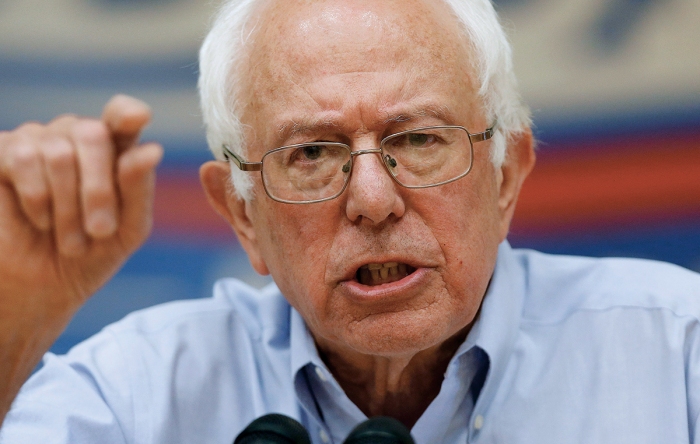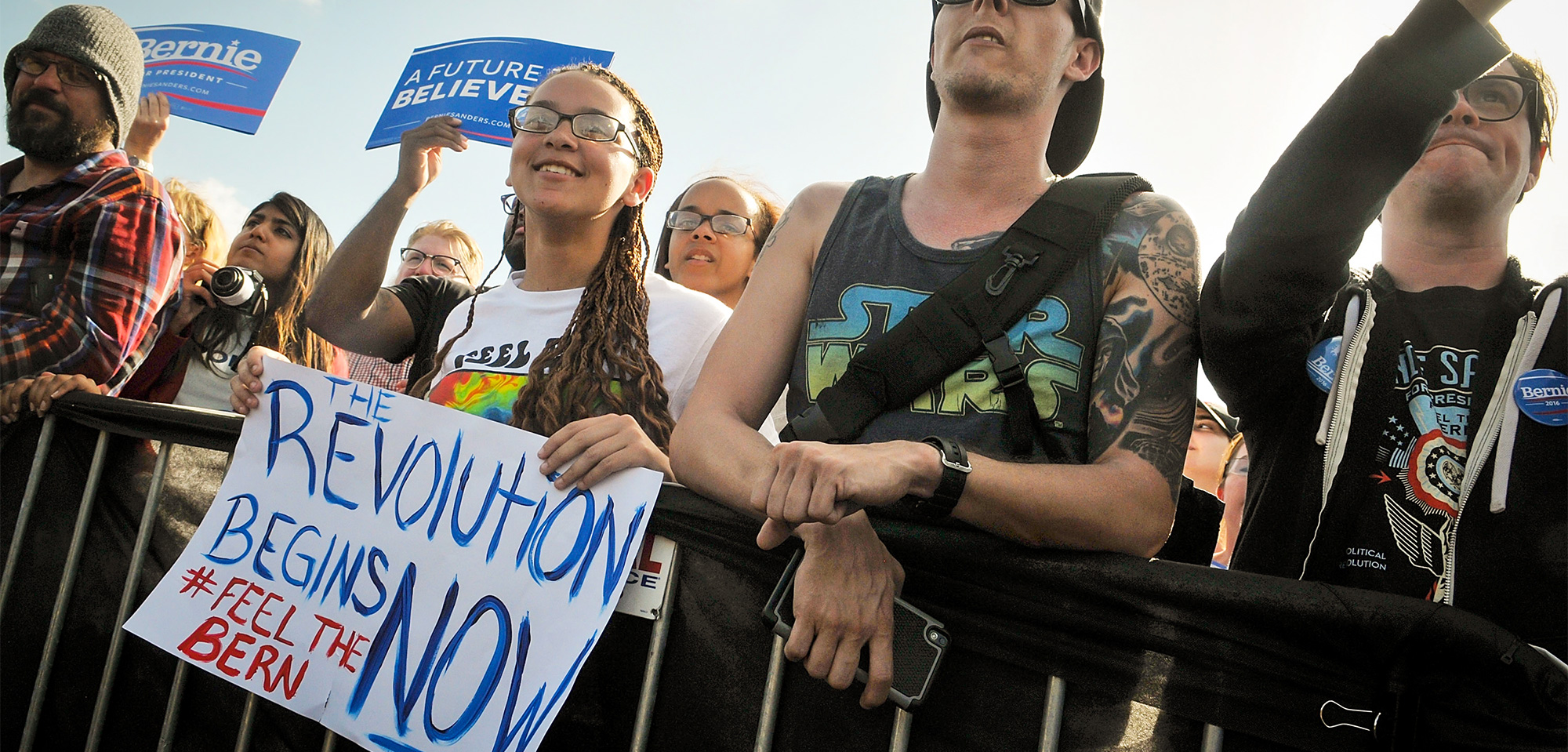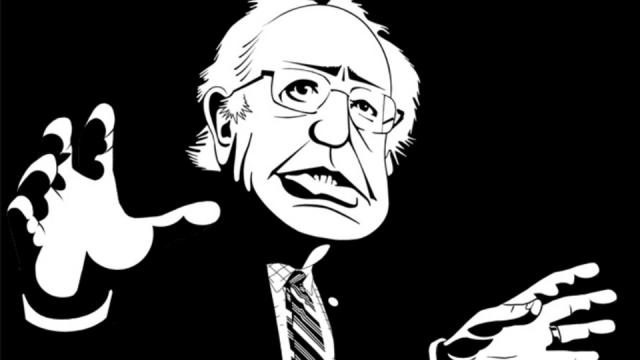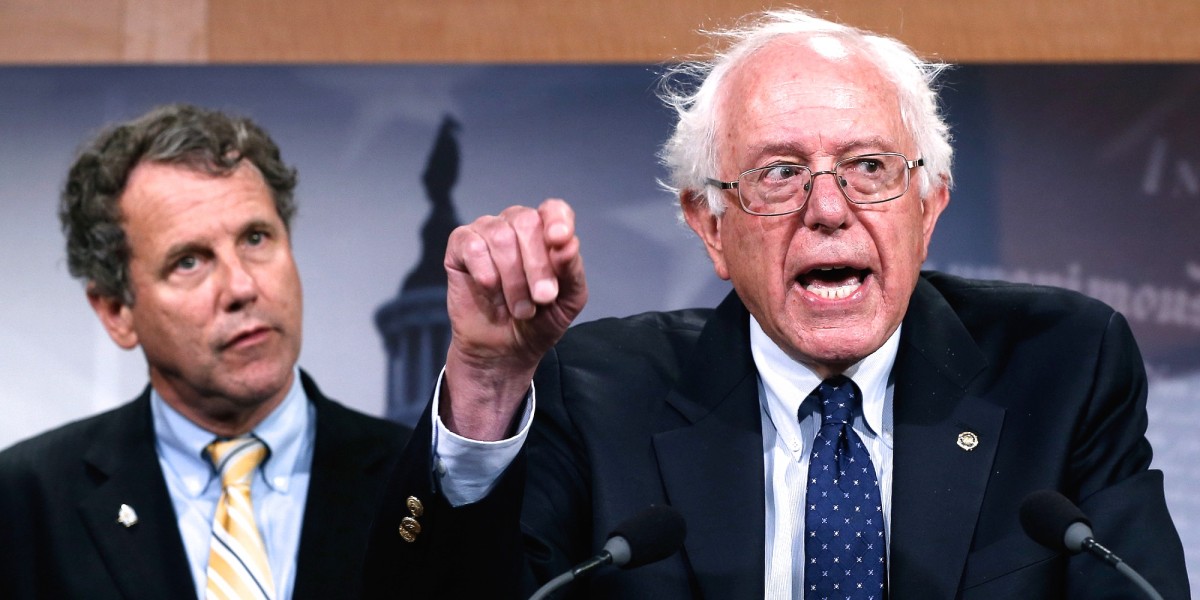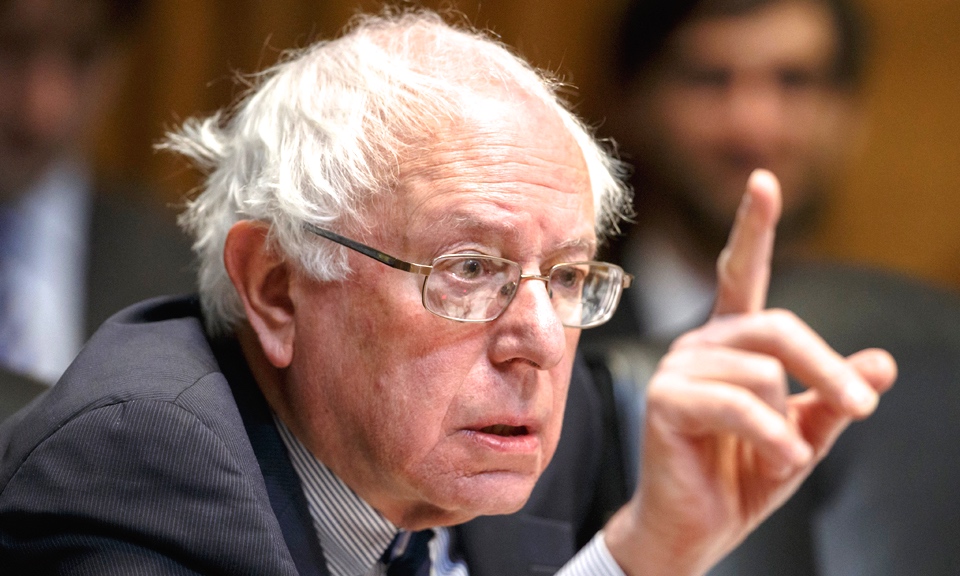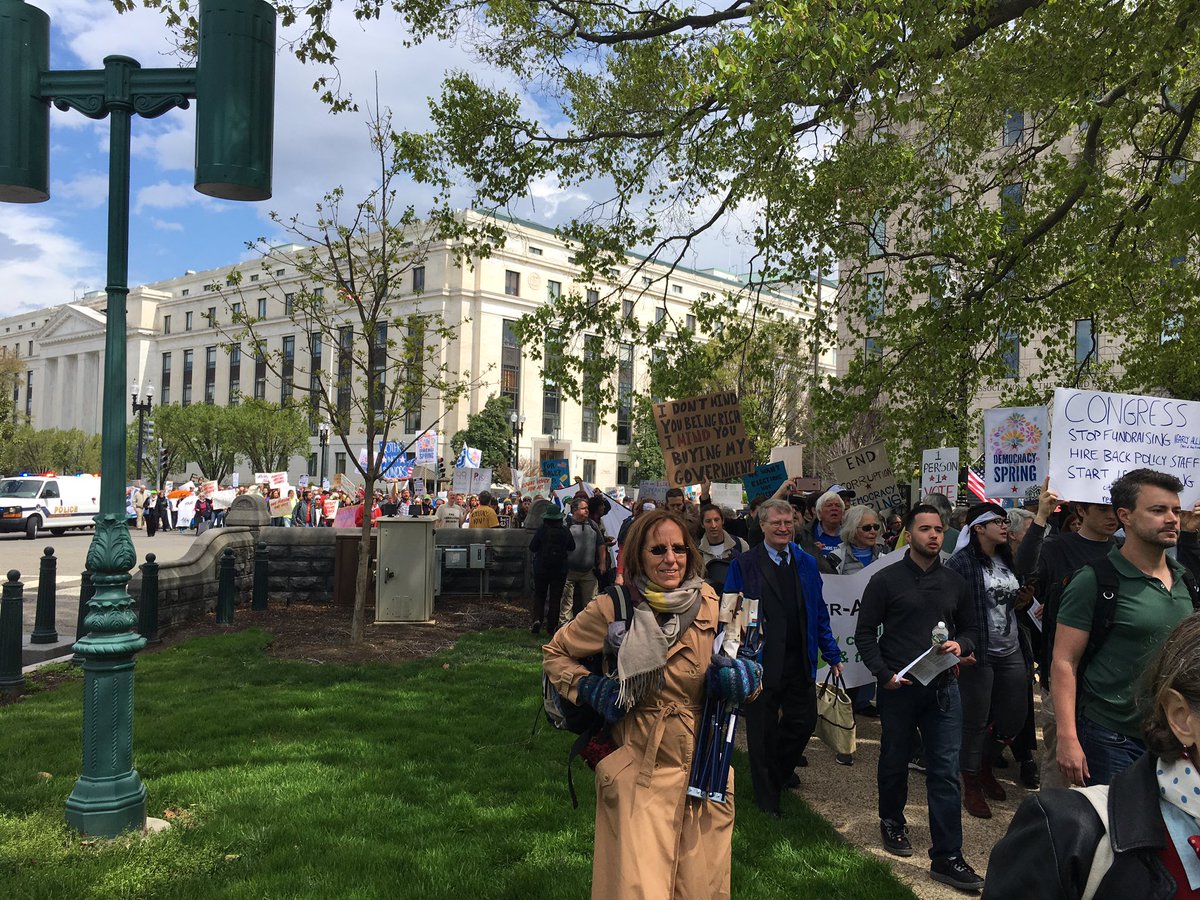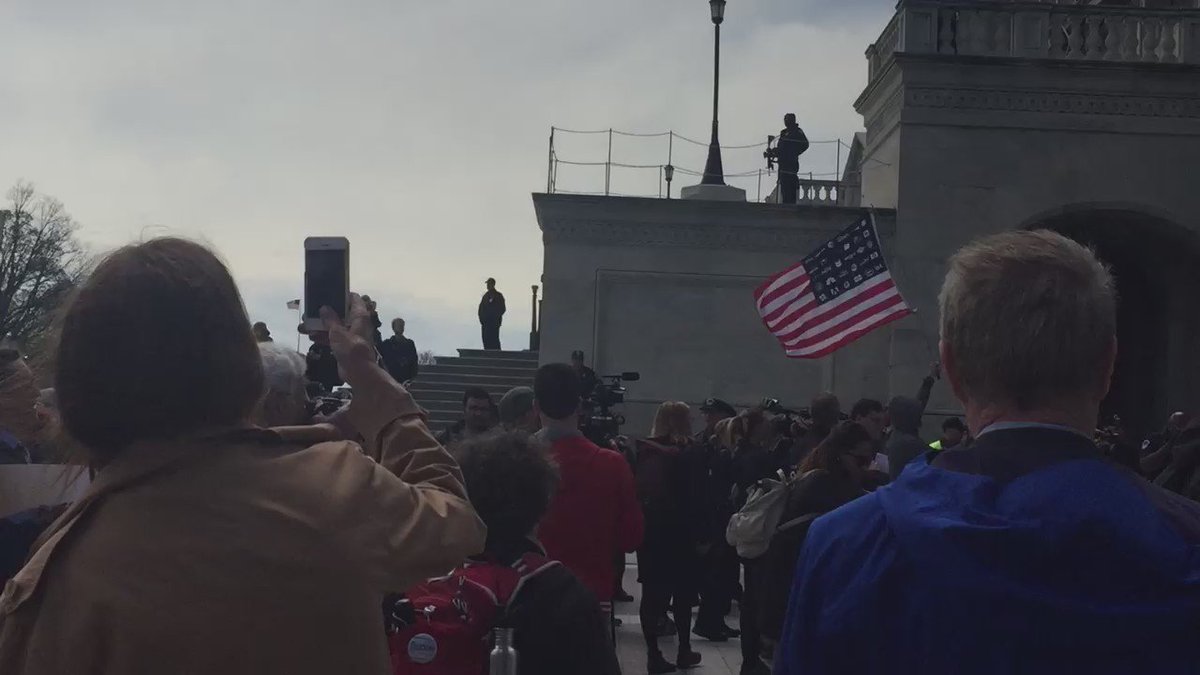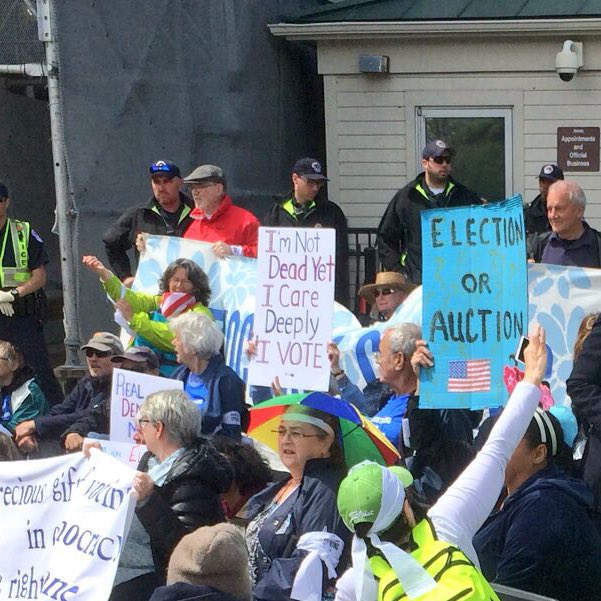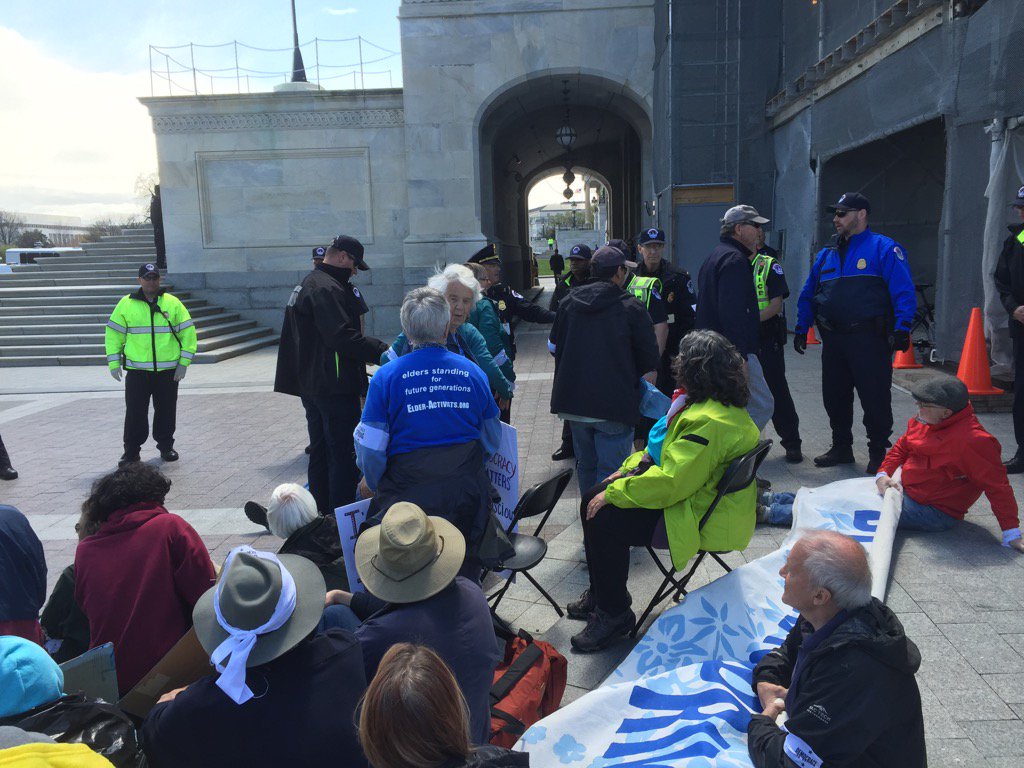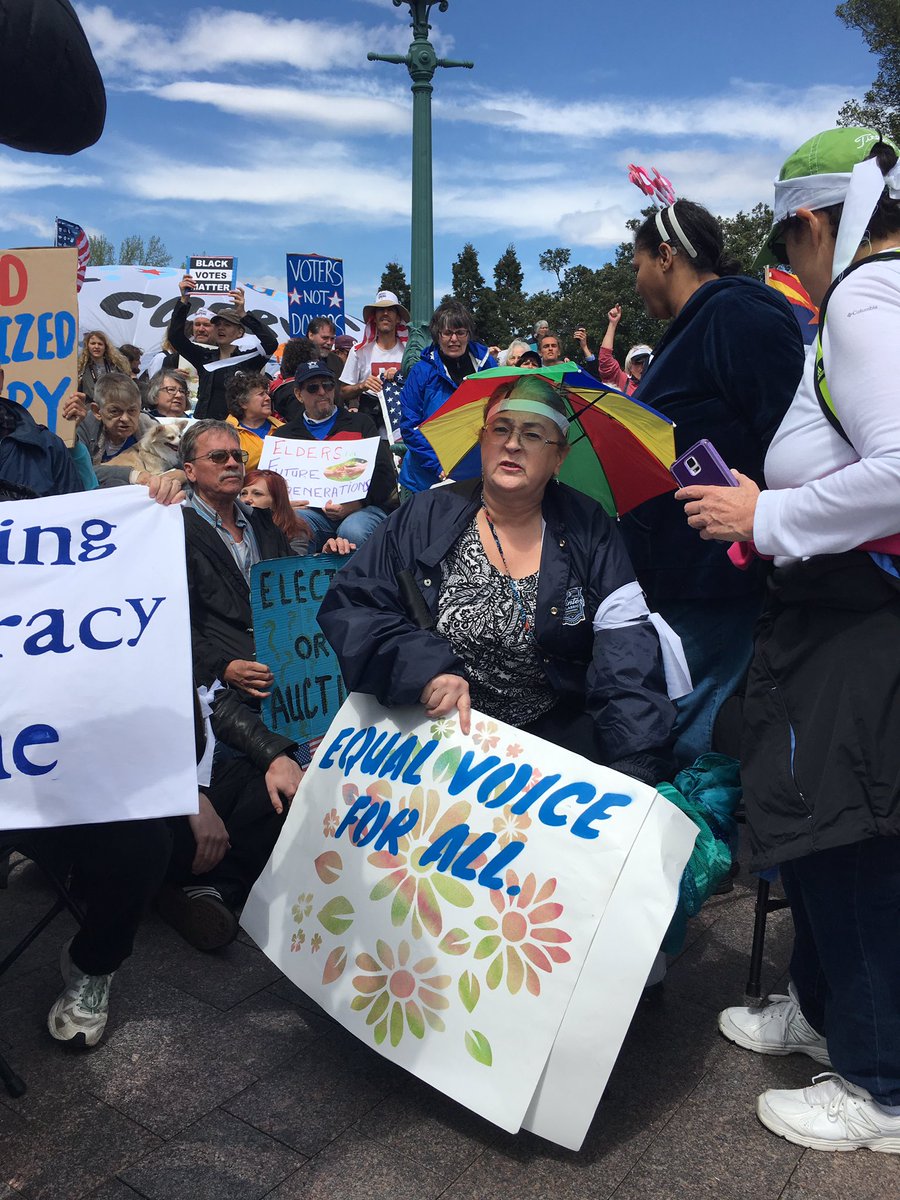
THE OTHER PROGRESSIVE CHALLENGERS TAKING ON THE DEMOCRATIC ESTABLISHMENT
BY CHRISTOPHER HASS
“TODAY,” BERNIE SANDERS BOOMS IN HIS MONOTONE SHOUT, “we begin a political revolution to transform our country—economically, politically, socially and environmentally.” He marks each beat with his right hand, as if conducting with an invisible baton. Behind him, a lone seagull flaps its wings as it flies across Lake Champlain. The crowd of 5,000 that has come to Burlington, Vt., on a sunny afternoon in May to witness Sanders’ official campaign announcement breaks into a cheer.
At the time, it was easy to dismiss talk of revolution as the rallying cry of a 74-year-old democratic socialist who clings too dearly to memories of the 1960s. Eleven months and more than six million votes later, Sanders’ call for revolution is harder to ignore.
But what, exactly, would this political revolution look like? It’s not hard to imagine Sanders marching in the streets with the masses—he’s walked plenty of picket lines, most recently alongside Verizon workers in New York City last October—but that’s not the revolution he’s calling for. For Sanders, political revolution means shifting control of American politics away from corporate interests, convincing non-voters to go to the polls and attracting white working-class voters back to the Democratic Party, all while moving the party left enough to embrace democratic socialist policies.
A political revolution of that kind is going to require two things: a wave of candidates committed to a bold set of progressive ideas and a mass of voters with the political will to elect them. There’s evidence both of these are already here.
IN THESE TIMES SPOKE TO U.S. HOUSE AND SENATE CHALLENGERS across the country who are very much a part of this wave. They are all outsiders to varying degrees, and all of them are running against the Democratic establishment in its various forms—from corporate donors and super PACs to the head of the Democratic National Committee herself.
These challengers range from first-time candidates to experienced lawmakers, from community organizers to law professors. Each is balancing the individual concerns of the voters they seek to represent alongside the larger mood of the nation. None of them is running because of Bernie Sanders, but they clearly benefit from the enthusiasm and sense of progressive possibility his campaign has created.
It would be a mistake to call them “Sanders Democrats” (and it’s unlikely Sanders himself would want anything to do with the term). Some have endorsed Sanders, others remain neutral or even back Hillary Clinton. But they are coalescing around a set of progressive policies familiar to anyone who has heard Sanders speak, including single-payer healthcare, free college tuition, a $15 minimum wage and breaking up the big banks. It’s hard to imagine a Democratic platform more at odds with Bill Clinton’s centrist Third Way of the 1990s.
More importantly, these positions increasingly reflect the popular will. Even after the brutal battles over Obamacare, polls show that more than half of Americans support moving to a single-payer healthcare system. Fifty-eight percent want to break up the big banks. Sixty-three percent support raising the minimum wage to $15. And Americans are nearly united in agreement (78 percent) that Citizens United should be overturned.
What’s striking about recent polling, though, is not the support for these progressive policies (many have enjoyed widespread approval for a while), but the openness to new, radical ideas—especially among young voters. In a January YouGov poll, people under 30 rated socialism more favorably than capitalism. On the eve of the Iowa caucus, when asked how they describe themselves, 43 percent of Democratic caucusgoers chose “socialist.” Take a moment to let that sink in.
THIS IS WHAT HAPPENS WHEN YOU HAVE A GENERATION OF YOUNG PEOPLE whose central experiences with capitalism have been two recessions, a financial crisis, crushing college debt, flat wages and soaring income inequality. For young people, the devil they don’t know is looking better and better than the devil they do—and that sentiment is fueling insurgent challengers.
Many of these candidates continually emphasize the need to purge U.S. politics of corporate money, starting with the Democratic Party.
“It’s easy for candidates to say they’re for overturning Citizens United, but it’s really meaningless when they’re also taking so much corporate and dark money that they’ll never follow through,” says
Tim Canova, who is running for Congress in Florida’s 23rd congressional district. “The Democratic Party has lost its way. It has gone corporate and Wall Street on so many issues that it has unfortunately turned its back on its own grassroots base.”
And it’s more than a matter of principle: Many of these candidates believe that voters are fed up with how the corporate capture of the party has pulled it to the right. “The Democratic Party has been Lucy with the football and the voters have been Charlie Brown,” says
Tom Fiegen, a candidate for Senate in Iowa. “Democrats have pulled the football away too many times, so the voters say, ‘Nope, I am not going to be tricked again. I am not going to have you lie to me and tell me you’re on my side, and then when I send you to D.C., you vote for the TPP or you vote for the Keystone Pipeline.’ ”
Nowhere is this trust gap felt more keenly than among young voters. Sanders has won the support of young people like few politicians before. In each of the 27 states that held primaries or caucuses in February or March, he won the youth vote, often by more than 50 points. In his home state of Vermont, he defeated Hillary Clinton among voters under 29 by an overwhelming 95 percent to 5 percent.
Tom Fiegen saw how this played out in Iowa. “In the conventions I went to,” he says, “there was probably 30 to 40 years difference in age between Bernie supporters in one half of the room and Hillary supporters in the other half of the room.” Fiegen himself has endorsed Sanders, and you can hear in his voice the same passion that has animated so many young people: “We are idealists. … We want a better world. We think we can achieve it. We’re willing to basically throw our bodies in front of the bus to do that.”
IT WOULD BE A MISTAKE TO OVERLOOK THE FACT THAT THIS YEAR’S ELECTION is playing out in a moment when protest movements have interjected themselves into the national conversation in a way we haven’t seen in a long time. Black Lives Matter, Fight for 15, the climate movement and more have demonstrated the value of setting uncompromising demands and pushing the boundaries of what is politically possible.
It’s no surprise then that some of these progressive challengers come directly out of protest movements.
Pramila Jayapal, a Washington state senator running for the 7th District seat in the U.S. House of Representatives, has a long history of activism and advocacy in Seattle. She founded the post-9/11 immigrant rights group Hate Free Zone (now OneAmerica), which has held massive voter registration drives.
“The only reason I got into politics was because I believed it was another platform for organizing,” she says, “and that’s what I want to do with my congressional campaign. We’ve brought in thousands of leaders, young people and people of color and women who never saw themselves as part of democracy.”
Joseline Peña-Melnyk, who is running for Congress in Maryland’s 4th District, says: “These movements give me hope for the future of our democracy. They show that the spirit that gave rise to the civil rights movement is still alive as people take up causes that matter and challenge the status quo.”
Donna Edwards, a co-founder of the National Network to End Domestic Violence now running for Maryland’s open Senate seat, agrees. “I’ve always believed in outside movements,” she says. “Government doesn’t move effectively and elected officials don’t move effectively unless they have a big push from the outside.”
Candidates like Debbie Medina, a democratic socialist running for state Senate in New York’s 18th District, are happy to be that push. As she told The Nation, “This election is just another rent strike.”
Sanders himself is arguably the biggest protest candidate of them all. But a funny thing is happening: Many of the protest candidates are winning. By the middle of April, Sanders had won 16 states, as well as the Democrats abroad primary. Donna Edwards has led by as much as 6 points. Polls show Lucy Flores, a Sanders supporter running for Congress in Nevada, leading by 20 points. In Maryland’s 8th congressional district,
Jamie Raskin’s two closest opponents are busy arguing over who’s in second place.
THE ESTABLISHMENT, HOWEVER, IS NOT GOING QUIETLY. In Florida, where Tim Canova is challenging Democratic National Committee Chair Debbie Wasserman Schultz for her congressional seat, news got out in March that the Florida Democratic Party (FDP) had denied Canova’s campaign access to the party’s voter file. His supporters created an uproar; the file is crucial to any campaign’s get-out-the-vote efforts. The FDP eventually backed down in order to avoid, in the words of the state party executive director, the “appearance of favoritism,” but the policy remains in place for all other Democratic primary challengers in Florida. And not just Florida—Democratic challengers in other states are routinely denied access to this data or charged extra for it.
“The DNC and state Democratic parties must stop favoring incumbents over insurgents in Democratic primaries,” Canova says. “We need to recruit activists committed to our progressive agenda to run for office, and that includes challenging incumbent Democrats.”
Given that these candidates want to rid the party of corporate influence, it’s no surprise that many are going head-to-head with big money. In Maryland, Jamie Raskin’s two biggest challengers in the Democratic primary are a wine mogul named David Trone, who has already spent more than $5 million of his fortune on the race, and Kathleen Matthews, who once oversaw the Marriott political action committee and is now herself the recipient of more lobbyist money than any Democrat running for the House in 2016.
“My [two] major opponents here have no real history of involvement in Democratic Party politics,” Raskin says. “They are creatures of the big money politics that have overtaken our country.” He’s won the endorsement of both liberal groups and a number of Democratic state lawmakers, and—borrowing a page from Sanders’ playbook—has relied on a surge of small-dollar donations to remain competitive. “Progressives are fired up here for a victory against big money,” Raskin says.
In Nevada,
Lucy Flores faces a multi-millionaire, Susie Lee, who has loaned her own campaign $150,000. But as Jeb Bush will tell you, money alone only gets you so far, especially in a year when voters seem more interested in authenticity.
“The number one lesson that everyone can learn from Bernie Sanders,” Tom Fiegen says, “and that I’ve tried to emulate is: Tell the truth.” Donna Edwards put it this way: “We should not run away from who we are as Democrats and the values that we share. … We lose elections because our voters stay home.”
FOR A PRESIDENT SANDERS OR A PRESIDENT CLINTON TO BE SUCCESSFUL, they’re going to need voters to come out not just in November, but in 2018, 2020, and beyond. For any president to enact a progressive agenda, they’re going to need a new Congress, made up of people like Donna Edwards, Jamie Raskin, Pramila Jayapal and others.
When Barack Obama first ran for president, he spoke frequently about how his election was not about him, but us. He may have meant it, but it was hard to shake the feeling that at that moment in American history, it was in fact very much about him and the qualities he possessed. Today, when Sanders uses the same language, you believe him—if for no other reason than it’s hard to imagine a wild-haired septuagenarian in a baggy suit as the catalyst for a popular movement. Clearly, something deeper is going on.
For the most part, Sanders himself has remained focused on his own election fight with Hillary Clinton. He has avoided talk of the future. But in a recent interview with Cenk Uygur of the “Young Turks,” Sanders let his guard down for a minute, saying, “We need, win or lose for me, a political revolution which starts electing people who are accountable to the working families of this country.” There it was—“electing people,” plural, not a single president. That’s what revolution looks like.





